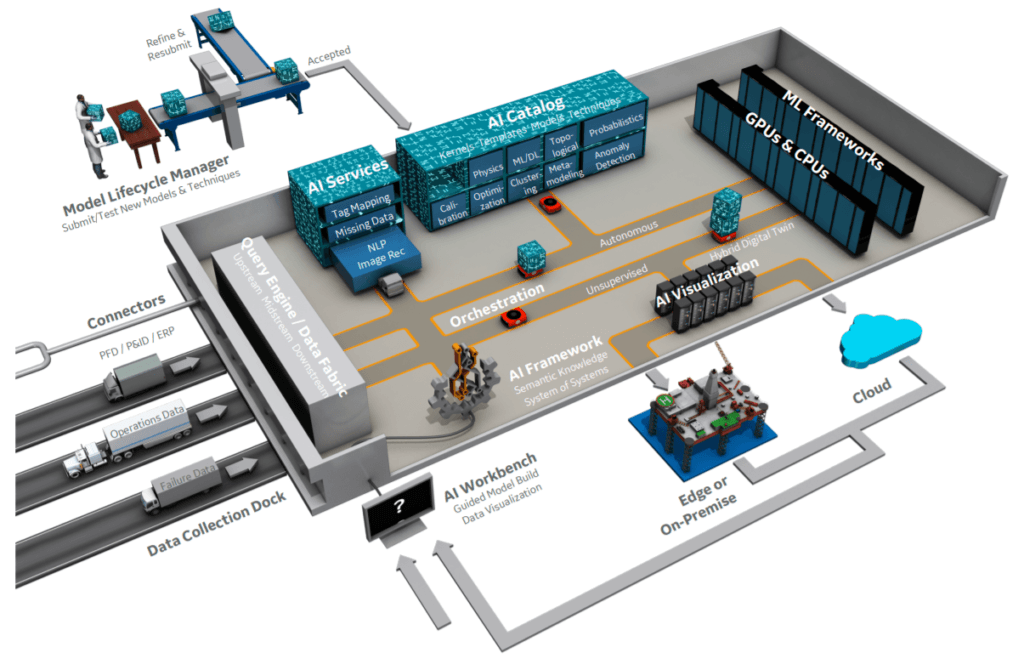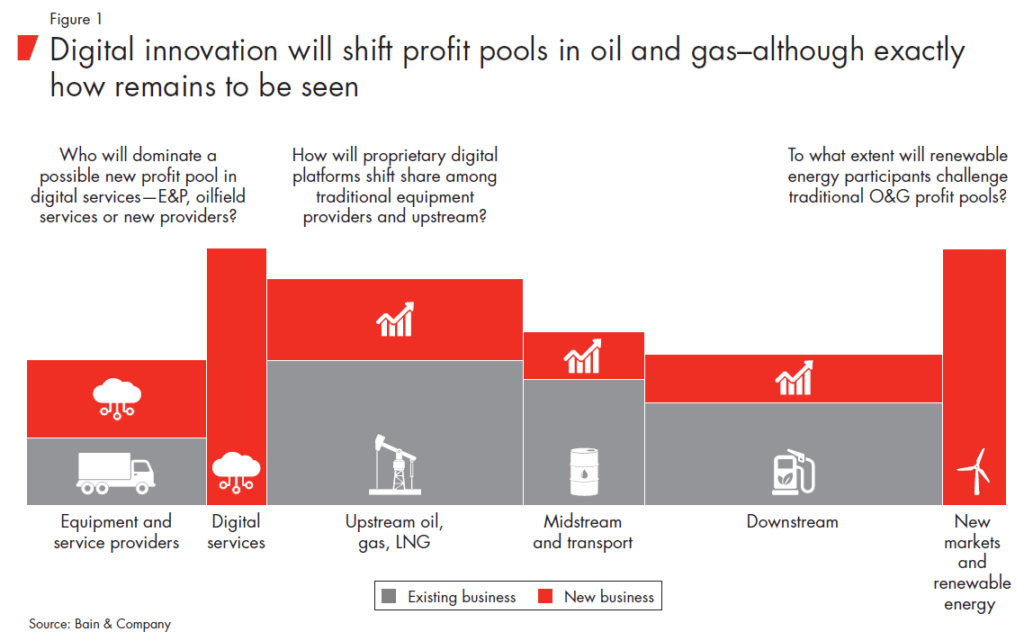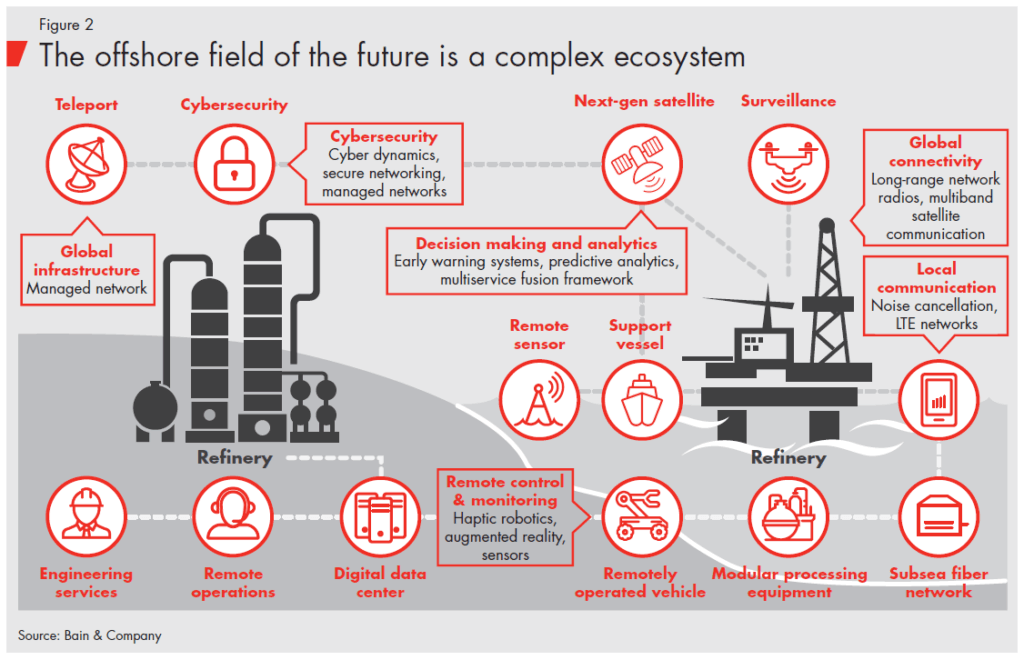A 126-year old company that sells Artificial Intelligence?

BHGE is finding new ways to create value for oil and gas customers by leveraging machine learning techniques.
Why would anyone buy cutting-edge technology from a 126-year-old company? For Baker Hughes, a GE Company (“BHGE”), entering the IoT software space early was a risky proposition—but one it couldn’t afford not to pursue. But why dive into machine learning specifically? And why now?
“Analytics are nothing new to oil, gas and energy companies. Their businesses have long depended on rich pools of data [and used reservoir modeling…] since the 1960s, and […] dynamic process optimization modeling […] since the 1980s 1. Given a market saturated with home-grown models, the only way for BHGE to disrupt the industry was by leveraging the competitive advantages offered by cloud-hosted machine learning (“ML”).
Recent advances in hardware technology have made ML not only more feasible—but also much more valuable, both for BHGE and for its customers.
- New sources of data: With the proliferation of new and improved data sources such as drones, BHGE has access to a growing pool of data. “Ninety percent of the digital data in the world today has been created in the past two years alone”2. “An average off-shore oil platform can generate between 1TB and 2TB of data per day, [but] it is estimated that only between 1-3 percent of this data is currently analyzed.”3
- Faster processing: Analytics developers like BHGE can now partner with hardware innovators like NVIDIA, and use their GPU processors to process the increasingly complex and large amounts of data. “Now you can render complex multi-layer deep learning networks with just a few clicks or process terabytes of data in hours or minutes.”4
- Remote access to data with mobile devices: Oil and gas field service engineers and operators often work in remote locations and require mobile access to critical information. With the increased prevalence of connected devices, users can now access this information when they need it most. “The right intelligence must be accessible in real time and in the right place to be effective.”5
To take advantage of these trends, BHGE developed a “BHGE AI Factory” [Exhibit 1] which provides several key features:
- Uncovering new insights and democratizing information: BHGE’s technology allows for customers to draw insights across previously siloed data given its cloud-based approach—allowing greater access to information across the organization, and thus enabling decentralized decision making and power6.
- Human augmentation: “With machines as sidekicks, […] people can more quickly find valuable insights buried in big data.”7 BHGE’s analytics have “[abstracted] away repeatable tasks like connecting to data sources, wiring models and maintaining versions” so experts can instead “focus [their] time on obtaining in-sights from [their] models and data”.8
- User-friendly UI: BHGE uses visualization tools allows experts to see information through a new light and draw new conclusions: “rapid visualization [brings] data to life with rich interactive applications enabled by GPU-powered visualization.” 9
Over the next two years, BHGE will be able to refine existing models and develop new ones as they acquire new customer data, leveraging both supervised and unsupervised deep learning for continuous improvement10. But beyond the next two years—who plays what role in the oil and gas ecosystem is yet to determined [Exhibits 2 & 3]. Today, oil and gas operators are hiring and developing their own data science and analytics talent internally11, while also partnering with software vendors such as Accenture, BHGE, and TCS to accelerate results—but as these groups start to develop differentiated intellectual property and expertise, partnerships will become more challenging and players will likely shift towards a more protectionist model.
As BHGE continues down their machine learning journey, they need to be cognizant of a few limitations and plan accordingly.
- Utilization of oil and gas industry expertise – BHGE should utilize industry experts in two ways. First, to find the right balance between unsupervised learning and supervised learning, given machine learning’s limitation around solely drawing predictive—and not causal—inferences. And second, to help with feature extraction. Although machine learning can use clustering to find relevant features, “domain experts can still be helpful in suggesting features, and in making sense of the clusters that the machine finds”12.
- “Leap of faith assumption” – BHGE is currently working off of limited data to develop and test its models. As the firm acquires new data, it needs to recognize when that data’s fundamentally changed, and be careful not to over-extrapolate and assume similar the relationships between inputs and outputs as what was previously the case.
One question which remains to be answered is just how much of the decision-making processes in oil and gas can be automated given machine learning’s limitation around predicting correlation but not causation. How will industry experts’ roles change in the next 5-10 years, and which skills will become more critical we shift to a world powered by AI?
(788 words)
Endnotes
- Peter Parry and Jennifer Schulze, “Unleashing Digital,” 2018.
- Brynjolfsson and A. McAfee, “What’s driving the machine learning explosion?” Harvard Business Review Digital Articles, July 18, 2017.
- Michael Guilfoyle and Craig Resnick, “Building Effective Analytics for Oil and Gas”, ARC View, http://info.bhge.com/rs/400-ZOJ-998/images/1_paper.pdf, May 17, 2018.
- “BHGE Analytics: Powering Smarter Oil & Gas Decisions”, http://info.bhge.com/rs/400-ZOJ-998/images/4_brochure.pdf, Accessed November 2018.
- Peter Parry and Jennifer Schulze, “Unleashing Digital,” 2018.
- “BHGE Analytics: Powering Smarter Oil & Gas Decisions”, http://info.bhge.com/rs/400-ZOJ-998/images/4_brochure.pdf, Accessed November 2018.
- James Wilson, Sharad Sachdev and Allan Alter, “How Companies Are Using Machine Learning to Get Faster and More Efficient,” Harvard Business Review Digital Articles, May 3, 2016.
- “BHGE Analytics: Powering Smarter Oil & Gas Decisions”, http://info.bhge.com/rs/400-ZOJ-998/images/4_brochure.pdf, Accessed November 2018.
- “BHGE Analytics: Powering Smarter Oil & Gas Decisions”, http://info.bhge.com/rs/400-ZOJ-998/images/4_brochure.pdf, Accessed November 2018.
- Michael Guilfoyle and Craig Resnick, “Building Effective Analytics for Oil and Gas”, ARC View, http://info.bhge.com/rs/400-ZOJ-998/images/1_paper.pdf, May 17, 2018.
- Valerie Jones, “Machine Learning to Transform Oil and Gas Industry”, Rigzone, https://www.rigzone.com/news/machine_learning_to_transform_oil_and_gas_industry-20-sep-2018-156978-article/, Accessed November 2018.
- Mike Yeomans, “What Every Manager Should Know About Machine Learning,” Harvard Business Review Digital Articles, July 07, 2015.
Exhibit 1: Overview of the BHGE AI Factory
Source: BHGE website, http://info.bhge.com/rs/400-ZOJ-998/images/2_infographic.pdf, accessed November 2018.
Exhibits 2&3: Profit pools and key players across the oil and gas ecosystem
Source: Peter Parry and Jennifer Schulze, “Unleashing Digital,” 2018.





It was really interesting to read about the way BHGE structures its machine learning initiative. Having access to new and unconventional data sources like drones and IoT devices would definitely provide competitive advantage. One thing I would be interested to learn more in BHGE case is its market strategy for machine learning products. What kind of value proposition are they going to come up with, which customers to sell to, and how are they planning to compete in already oversaturated machine learning and AI market?